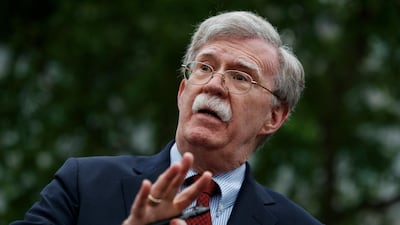US President Donald Trump’s former national security adviser, John Bolton, said on Monday he is willing to testify in the expected Senate impeachment trial of the president.
The move is a surprise development that could potentially strengthen the case that Mr Trump should be removed from office.
As a top White House aide who witnessed many of the events that prompted the House of Representatives to impeach Mr Trump in December, Mr Bolton could provide new evidence about the president's efforts to pressure Ukraine to investigate a political rival.
Other witnesses during the House impeachment investigation testified that Mr Bolton strongly objected to an effort by Trump’s personal lawyer, Rudy Giuliani, to pressure Kiev outside of regular diplomatic channels, with one saying he referred to the arrangement as a “drug deal.”
Congressional investigators believe Mr Bolton objected to Mr Trump’s decision to delay $390 million in military aid to Ukraine and could shed light on the reasons why he did so, a Senate aide told Reuters.
Mr Bolton’s lawyer said in November that he could shed new light on White House discussions, but he refused to participate in the House impeachment inquiry while the Trump administration and Congress battled in court for access to witnesses and documentary evidence.
He said he is now willing to cooperate after a judge dismissed the case last week.
“If the Senate issues a subpoena for my testimony, I am prepared to testify,” Mr Bolton said in a prepared statement. He declined further comment.
Democrats seized on Mr Bolton’s announcement, saying it bolstered their argument that he and three current administration officials should testify when the Senate begins its impeachment trial.
“If any Senate Republican opposes issuing subpoenas to the four witnesses and documents we have requested they would make absolutely clear they are participating in a cover up,” Senate Democratic Leader Chuck Schumer said.
Mr Trump’s fellow Republicans have resisted that idea, instead seeking a quick trial based on the evidence collected in the House that could lead to the president’s expected acquittal before the 2020 presidential election campaign heats up.
The two sides have not come close to an agreement on how the trial should proceed, aides say.
In remarks on the Senate floor, Republican Leader Mitch McConnell repeated his proposal that the chamber postpone a decision on whether to call witnesses until after the trial begins. That could allow Republicans, who control the chamber by a margin of 53-47, to wrap up the trial without hearing from Mr Bolton or other witnesses.
Democrats hope to persuade at least four Republicans to side with them to get the majority vote they would need to call witnesses.
House of Representatives Speaker Nancy Pelosi, the top Democrat in Congress, has yet to send the House-approved articles of impeachment to the Senate, putting a hold on any schedule for a trial. The earliest the House could take any action would be on Tuesday when it reconvenes.
The Democratic-led House has charged Mr Trump with abusing his power for personal gain by asking Ukraine to announce a corruption investigation of former Vice President Joe Biden, a leading contender for the Democratic nomination to face Mr Trump in November’s presidential election.
It also charged the president with obstructing Congress by directing administration officials and agencies not to cooperate with the impeachment inquiry.
Mr Trump says he did nothing wrong and has dismissed his impeachment as a partisan bid to undo his 2016 election win.
“I think they’ve lost their minds,” Mr Trump said on Rush Limbaugh’s radio program, referring to Democrats.
The White House could potentially try to block Mr Bolton from testifying. That dispute would probably be resolved by the Chief Justice of the Supreme Court, who will preside over the Senate trial, or senators themselves, rather than in court, said Ross Garber, a Washington lawyer who has represented Republican governors in impeachment proceedings.

